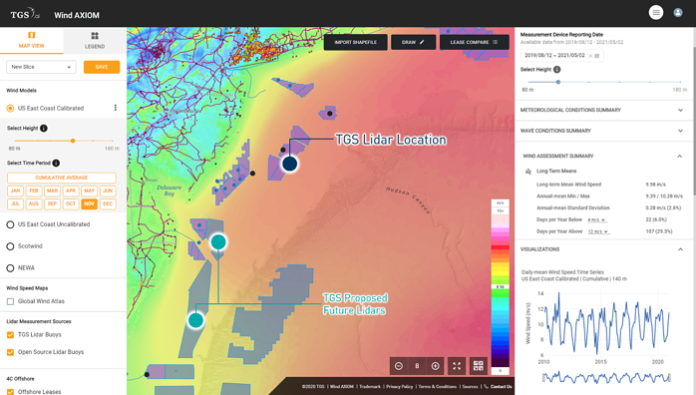TGS has started its first multi-client offshore wind measurement campaign in the New York Bight area off the U.S. East Coast, utilizing the global energy data and intelligence provider’s high-resolution coverage of numerical weather prediction (NWP) model data by including floating LiDAR wind measurements. This combination of wind resource models and real measurements will enable more accurate forecasting of the wind energy potential in the area.
The multi-client approach offers offshore wind stakeholders the added benefits of reduced development costs and timelines, as the TGS-deployed floating LiDAR will provide data and insights on a subscription basis to many customers within the region with the aim to enhance the knowledge and reduce wind flow modeling uncertainties.
In this project, TGS is utilizing an advanced floating LiDAR system with a high level of accuracy (stage 3 validation) from EOLOS. The data will be acquired continuously throughout a two-year deployment campaign, and the data stream will be quality-controlled and made available to customers daily. In addition to the LiDAR wind speed measurements, the data package will include critical metocean and environmental data. This includes significant wave heights and ocean current profile as well as acoustic monitoring of whales, dolphins, birds and bats.
“I am pleased to see the momentum we are creating within the TGS New Energy Solutions portfolio; our ambition is to generate actionable insights and create pathways for the most efficient and highly accurate assessments of new offshore wind lease rounds,” says Kristian Johansen, CEO at TGS. “This project is a prime example of such development.”
The data will be delivered via the Wind AXIOM platform, TGS’ comprehensive site evaluation and wind data analytics tool. Wind AXIOM allows offshore wind developers and stakeholders to constrain the most influential factors affecting the viability of offshore wind projects, using wind models and measurements to answer questions related to energy output, annual revenue, supply fluctuations and more. Wind model inputs are complemented by a range of cost-influencing factors, creating a tool that improves the quality and speed of decisions by offering a configurable experience for various participants in the offshore wind market.
“The LiDAR initiative demonstrates that TGS’ business models and digital capabilities are leveraged and supported by the customers in the fast-growing offshore wind market segment,” adds Katja Akentieva, vice president of new energy solutions for the Western Hemisphere. “Our recently developed Wind AXIOM data analytics platform will be significantly strengthened and differentiated by the inclusion of the floating LiDAR wind speed and metocean measurements. We plan to expand this initiative in high potential offshore wind regions in the United States and beyond.”




